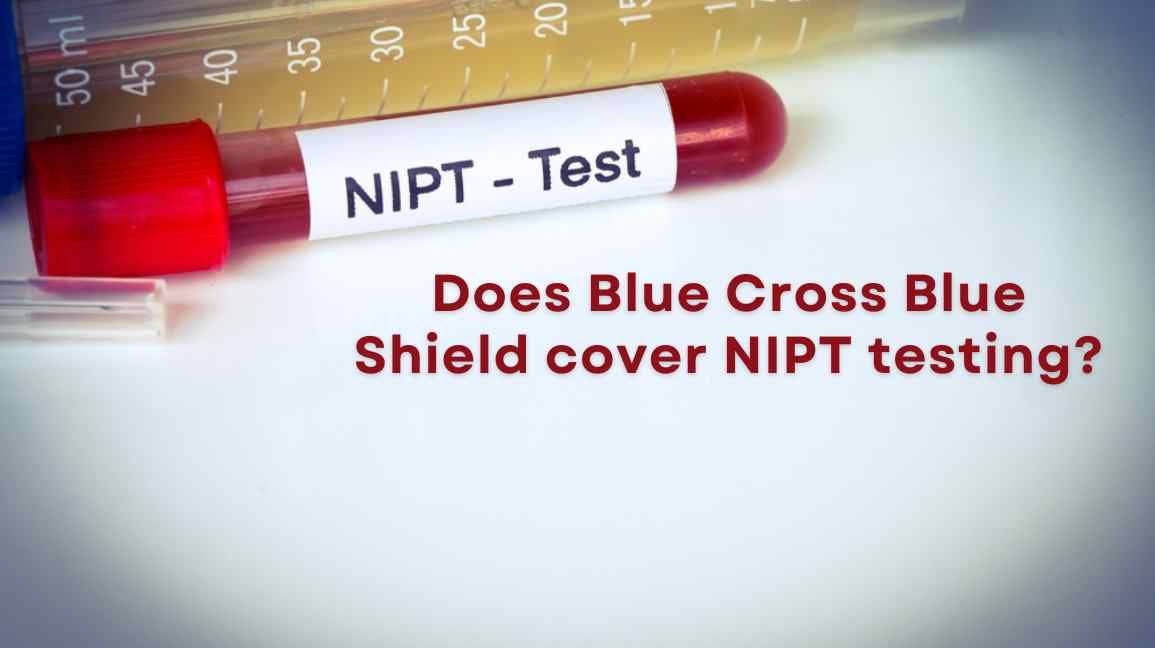
Understanding health insurance can be really confusing, especially when it comes to specialized tests like the Non-Invasive Prenatal Testing (NIPT).
This advanced test, designed to analyze fetal DNA in a mother’s blood to detect genetic abnormalities early in pregnancy, has become increasingly sought after by expectant parents. If you have Blue Cross Blue Shield (BCBS) health insurance, you may be wondering if they cover the cost of this test.
In this article, we’ll explore the coverage policies of Blue Cross Blue Shield for NIPT testing, including criteria for coverage and how to ensure your test is included under your plan.
What is NIPT Testing?
Non-Invasive Prenatal Testing (NIPT), also known as cell-free DNA screening, is an advanced procedure which is used to detect different genetic conditions in a fetus during pregnancy.
It involves drawing a blood sample from the expectant mother and analyzing it for tiny fragments of fetal DNA that circulate in her bloodstream.
NIPT is highly effective in screening for chromosomal abnormalities like Down syndrome (Trisomy 21), Edwards syndrome (Trisomy 18), and Patau syndrome (Trisomy 13). Additionally, it can provide insights into the baby’s sex and rhesus (Rh) blood type.
It is considered a safe and non-invasive alternative to traditional methods like amniocentesis or chorionic villus sampling (CVS), which carry a small risk of miscarriage.
Benefits and Limitations of NIPT
Benefits of NIPT
- NIPT offers over 99% accuracy in detecting chromosomal abnormalities, providing expectant parents with peace of mind early in the pregnancy.
- Unlike amniocentesis or CVS, NIPT involves only a blood draw from the mother, posing no risk to the fetus.
- NIPT can be performed as early as 10 weeks into the pregnancy, allowing for early decision-making and planning.
- Beyond chromosomal abnormalities, NIPT can reveal the baby’s sex and Rh blood type, which can be valuable for medical and personal reasons.
Limitations of NIPT
- While highly accurate, NIPT is a screening test and cannot provide definitive diagnoses. Abnormal results require confirmation through diagnostic tests like amniocentesis.
- Without insurance coverage, NIPT can be costly, making it less accessible for some families.
- Right now, NIPT is only given by the NHS to women whose blood test results (from the NHS’s combined or quadruple test) show a high chance of the baby having a condition called trisomy.
- Though rare, there is a small chance of receiving a false positive or negative result, leading to unnecessary anxiety or reassurance.
- It is not available for pregnancies with triplets or more.
- Women who got an organ transplant or a blood transfusion less than four months ago can’t use it.
Who is Recommended to Undergo NIPT?
Previously, NIPT was recommended only for women seen as having a high risk, like:
- Those who are 35 or older when they have their baby, because older moms have a higher chance of having babies with chromosome problems.
- Women who’ve had a baby before with chromosome issues.
- If you’ve had unusual results from other baby checks or ultrasounds, indicating a possible higher risk of chromosome problems.
- Those women who have a family history of genetic conditions.
However, The American College of Obstetricians and Gynecologists (ACOG) now says all pregnant women should get the NIPT test, no matter their age or risk.
What is the Cost of NIPT Testing With or Without Insurance?

According to the NIH, the cost of Non-Invasive Prenatal Testing (NIPT) varies by country. In the US, it ranges from $800 to $2,000, while other countries might see prices between $500 and $1,500. In Canada, it’s approximately C$600 to C$800. There’s still some uncertainty about how NIPT fits with other prenatal tests, so it’s not just about the price but also how it works in the system.
The price of NIPT testing without insurance changes based on the lab and test type, but here’s a basic idea:
Generally, If you’re paying yourself, the cost for a basic NIPT test, which looks for common conditions like Down syndrome, Edwards syndrome, and Patau syndrome, is usually between $299 and $349.
Sometimes, labs might charge a lot more, up to $1,100 to $1,590, but they often give a discount if you’re paying on your own.
BCBS covered the majority of the cost after you paid 15% of the total. However, be cautious with Out of Network charges, particularly for labs, as these can be expensive. Labcorp is the “preferred” testing company for BCBS.
Read also: Does BCBS Cover Abortion Pills?
Coverage for NIPT under BCBS
Is NIPT Testing Covered by BCBS?
Yes, Blue Cross Blue Shield often covers NIPT testing, especially for high-risk pregnancies. But, what they cover can change a lot depending on the plan and geographical location.
Most BCBS plans provide coverage for NIPT under certain conditions, like when the expectant mother is over the age of 35, has a history of pregnancies with chromosomal abnormalities, or when initial screening results indicate a high risk of genetic disorders.
According to some users, BCBS covers the majority of the cost after you pay 15% of the total. However, be cautious with out-of-network charges, especially for labs as these can be expensive. BCBS prefers using Labcorp for tests.
To ensure NIPT is covered under your BCBS plan, it’s best to consult with your insurance provider and get pre-authorization before undergoing the test.
Criteria under which BCBS covers NIPT
To understand the criteria under which Blue Cross Blue Shield (BCBS) covers Non-Invasive Prenatal Testing (NIPT), it is essential to note the specifics can vary considerably by plan and location.
- Age Factors: Women over the age of 35 at the time of delivery are frequently eligible for NIPT coverage due to the increased risk of chromosomal abnormalities with maternal age.
- Medical History: If you or your close family have had genetic disorders, or if past pregnancies had chromosomal issues, you might qualify for coverage.
- Screening Results: Abnormal or inconclusive results from initial screenings (like the combined first-trimester screening or quadruple marker test) might necessitate NIPT for clearer insights, often covered by insurance.
- Doctor’s Recommendation: A recommendation from a provider based on specific medical criteria or perceived risks can also be a significant factor in securing coverage.
- Multiple Pregnancies: Insurance usually doesn’t cover NIPT for triplets or more, but there can be exceptions based on the mom’s health and past.
How to check your BCBS plan’s coverage details
To check your BCBS plan’s coverage details for NIPT testing, consider the following steps:
- Contact Customer Service: Start by calling the customer service number on the back of your insurance card. This is the fastest way to get specific information about your plan.
- Search your BCBS plan provider’s website: Search for words like “NIPT” or “prenatal screening” on their site. Some BCBS providers, like Excellus BlueCross BlueShield and Blue Cross NC, share information online.
- Pre-Authorization Requirement: Inquire if pre-authorization is needed for NIPT. Some plans require this step to confirm the test will be covered.
- Understand Out-of-Network Charges: Confirm whether your plan has higher costs for using labs that are not in BCBS’s preferred network.
- Ask About Deductibles and Copays: Make sure you understand any deductibles that must be met before coverage starts and any copayments or coinsurance amounts you’ll be responsible for.
Important Things to Note About NIPT and BCBS Insurance
- If your plan doesn’t cover NIPT, it might still cover older prenatal screening tests. These cost less but aren’t as accurate as NIPT.
- Info you find on places like Reddit might not always be right or new. It’s best to check with official stuff like your BCBS plan papers or ask their customer service.
- While NIPT is sometimes referred to as “non-invasive”, it can still be counted as invasive by some insurance providers, who might not cover the test if it’s not medically necessary.
- Even if you meet all the criteria for coverage, the final decision on whether or not to cover NIPT testing lies with your specific BCBS plan and its policies. It’s best to confirm coverage with your insurance provider before undergoing the test.
Conclusion
In conclusion, many BCBS plans offer coverage for NIPT, especially for high-risk situations or specific conditions like the mother’s age or health history. But, it’s important for parents-to-be to really check what their insurance covers.
Before you decide, talk to your insurance company, learn about extra charges if the service isn’t covered, and you might need to get approval first. This can help you understand better and might save you money. Insurance plans are different for everyone, so make sure to check your own to know exactly what’s covered for prenatal testing.
FAQ
Can I get NIPT covered by BCBS if I’m under 35?
Yes, you can still get NIPT covered by BCBS even if you’re under 35, but it usually depends on certain conditions like your medical history or if early tests show you might have a higher risk for genetic conditions. Always check with BCBS first to see if you qualify.
What if my NIPT is not covered by BCBS?
If your NIPT is not covered by BCBS, you have a few options. First, discuss with your provider any alternative tests that are covered and can provide the information needed. Secondly, consider applying for financial assistance programs offered by testing companies. Lastly, check if you can use a Health Savings Account (HSA) or Flexible Spending Account (FSA) to manage the costs.
Can NIPT replace other prenatal screenings?
NIPT offers comprehensive insights into fetal health early in pregnancy, but it doesn’t entirely replace other prenatal screenings. Other tests, including the first-trimester screening and the anatomical ultrasound, give us more details about the baby’s growth and health that NIPT doesn’t cover. So, it’s usually suggested to do NIPT along with these tests for a full picture.
Resources
- NHS UK – Non-invasive Prenatal Testing
- MedlinePlus: What is noninvasive prenatal testing (NIPT)?
- [American College of Obstetricians and Gynecologists – Noninvasive Prenatal Testing (NIPT)](https://www.acog.org/advocacy/policy-priorities/non-invasive-prenatal-testing)